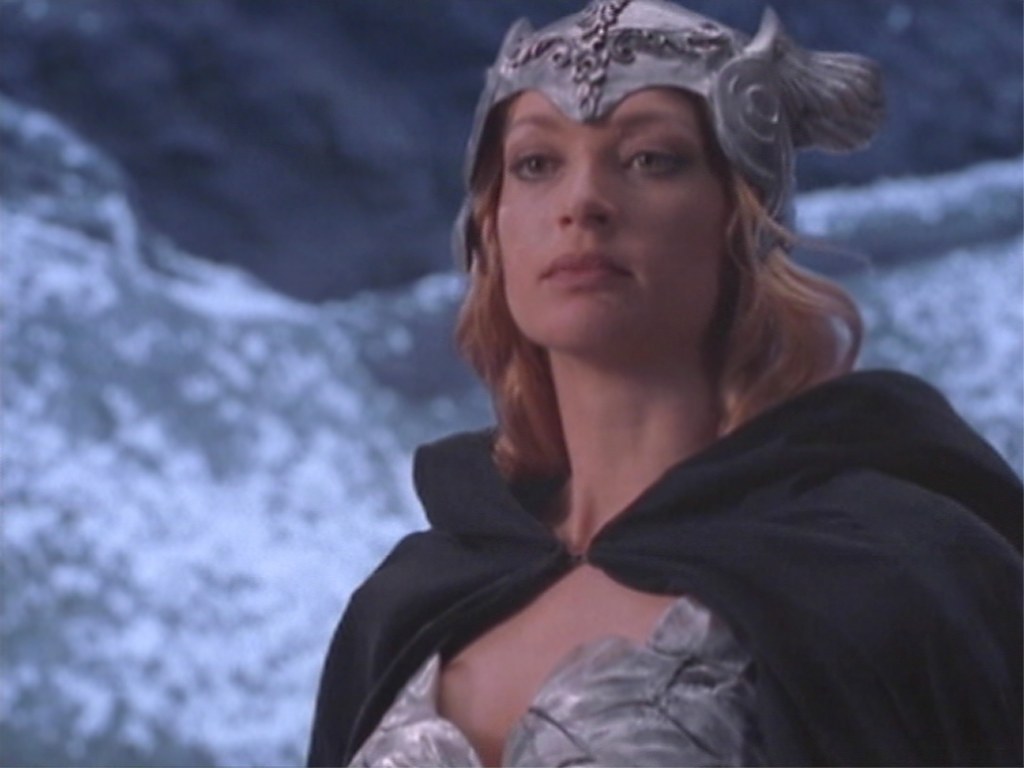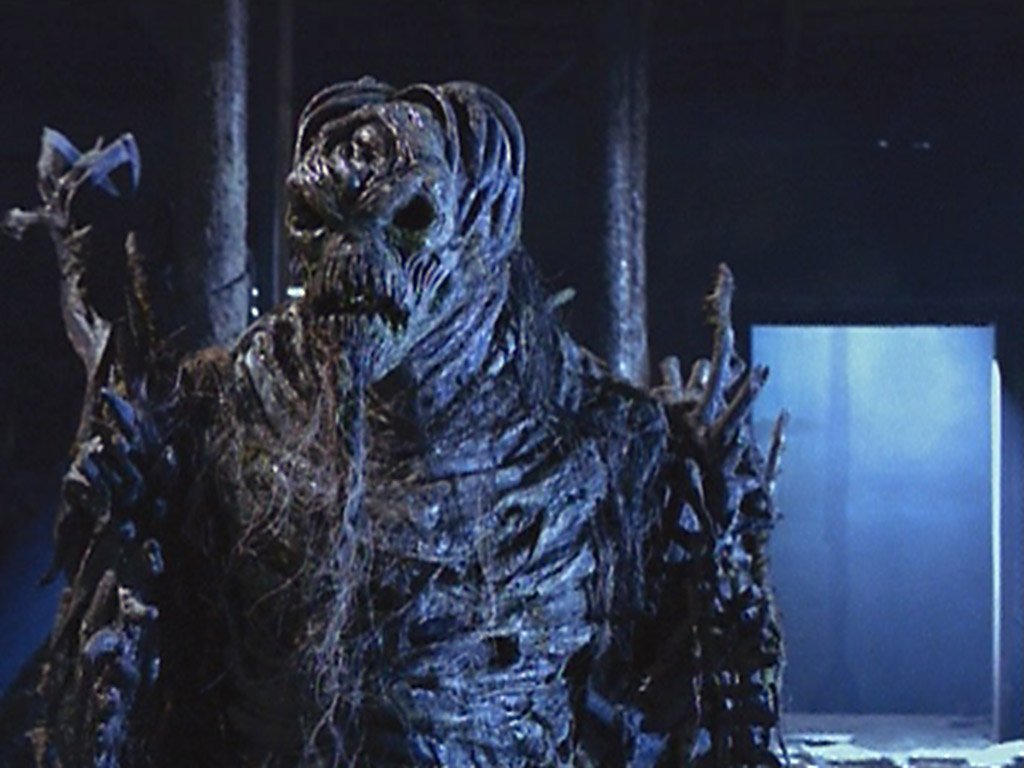Unlike most of my friends, I wasn't very much a television child, and so I missed out on Xena: Warrior Princess (along with Saved by the Bell, The Fresh Prince of Bel Air, and Friends - which apparently makes me a freak of nature, causing people to gasp when I admit to these facts). But, little did I know that when I was doing my MA I would be faced with the program which I associated so much with strange costumes and even stranger shouting.
I am in China now? Whut? I share your confusion, Xena.
Anyway, strangely enough, Xena appears to be one of the very few out of the many adaptations that presents Grendel's Mother to us in an explicitly positive light. Even when she looks like the giant cockroach from Men in Black, we still think she's pretty okay.
So, Grendel's Mother appears in three episodes of Xena from 2000 - "The Rheingold", "The Ring" and "Return of the Valkyries". She appears as Grinhilda, chief of the valkyries and lover of Odin. Beowulf and Grendel (who appears as Grindl) also appear in these three episodes but don't really have much importance...cause...well, it's Xena.
At the start of "The Rheingold" we see Grinhilda through a flashback, where she appears as the extremely powerful giant turd/cockroach fighting Xena for possession of the Rheingold (a magical ring from Richard Wagner's 19th century opera, Das Rheingold, itself influenced by Norse and Germanic mythology - the Rhine gold can be made into a ring which will let its bearer rule the world, so long as he or she has renounced love).

Grinhilda
Xena and Grinhilda have a bit of a tussle before Xena manages to lock Grinhilda in a cave. We are then taken to the present day, where the story of Grinhilda is recited by the character Brunhilda (prepare yourselves for a long-winded and probably confusing retelling of these episodes):
Back in what is known as Xena's "dark days" (try not to laugh), Xena is chosen by Odin as a valkyrie. Unlike the peaceful Grinhilda, Xena is absolutely gagging for some fightin' and blood spill. In her attempt to gain more power, Xena visits the three Rhein maidens and steals the Rheingold from them, and smelts it into a ring (as the dwarf Alberich does in Wagner's Ring Cycle). Grinhilda, being a good girl, tries to stop Xena from using the ring, and so, places it on her own finger, where we see her transformed into the monster she has become, for she has not forsaken love. The ring destroys that which is most loved by the wearer - in this case, it is Grinhilda's own beauty and humanity.

Grindl - and what a handsome boy he is
We are then brought back to the present day, where Xena and Beowulf (who has called on her help) are seen fighting a monster who is revealed to be Grindl (Grendel - and presumably Odin's son). They manage to kill him and we are shown Grinhilda mourning his death, and presumably intent on revenge (who would Grendel's Mother be without revenge?), and she then shows up, along with Odin, to fight Xena. Xena then places the ring of power on her finger, but, surprise surprise, it turns out the Xena has not forsaken love either, and loses her memory.
The next episode presents to us the amnesiac Xena who is now known as 'Wealthea' (an obvious reference to Wealhtheow) and is marrying Hrothgar. Thankfully, Beowulf shows up and reminds her who she really is, and she can go back to fighting Grinhilda. Rather than fighting with her however, she convinces Grinhilda of her former humanity, and she is transformed back into her good old self. Funnily enough, with this, all is forgiven (even Xena's killing of her son...) and Grinhilda returns to her former valkyrie job.
So! That's that. A rather confusing retelling, interlaced with a lot of Norse and Germanic Mythology and obviously influenced very much by Wagner's opera. But... it must be said, it's original, if a bit silly at times - but then again, it is Xena. It is very much like Parke Godwin's Tower of Beowulf, with its strong threads of Norse mythology as well as a very complex Grendel's Mother,, but that is for another day.
I'm going to focus more on Grendel's Mother as she is depicted here. I know I said she was explicitly positive in this, and then went on to talk about how she was a giant turd-monster, BUT, this is a positive retelling of her character, because it's not her fault that she turns into a monster (it's actually Xena's fault), and her extreme humanity and noble background are very much pushed in this. She is physically cursed and turned into a monster, very much like critics and translators have turned the Grendel's Mother of Beowulf into a monster (I'm getting deep here). Also important, is the fact that unlike Zemickis's or Baker's adaptations, her human form is not capitalised upon, and she is not overly sexualised.

And what about Grendel's Mother as a valkyrie, one of the "choosers of the slain"? Although it seems like a bit of an unorthodox view, and simply another norsification of the story, it's not an unfounded view, as Helen Damico (in "The Valkyrie Reflex in Old English Literature") argues that the valkyries were "half-mortal, half-supernatural beings called idisi in Old High German, ides in Old English and dis in Old Norse". Damico believes that the Beowulf poet is characterising Grendel's Mother as one of these "deadly battle demon[s]". She is after all, called an ides aglæcwif and a wælgæst wæfre, which Damico translates as "roaming slaughter-spirit". Damico also suggests that Grendel's Mother's protective covering may relate to the helm and byrnie of the valkyries.
Although I'm not necessarily agreeing with this view of Grendel's Mother as a valkyrie, I am pointing it out as a possible influence on Xena's depictions of her, as, I feel, many adaptations, especially film or television adaptations, are often not given credit for researching their sources or the scholarship surrounding them. Of course, the writers of Xena may not have even heard of Helen Damico, but I will give them the benefit of the doubt, and either way, such depictions, whether or not based on an already established theory, can offer new possibilities and new ways of viewing the original poem.
Overall, for once, Grendel's Mother plays a pretty important role, one more important than both her son and Beowulf. In general, Xena (along with shows like Buffy) is one of those shows that differs from the rest, in that its centred on female figures, but as well as that, it's characters rely less on their sexuality (as so many unfortunately do) than on their physical strength and cunning - they are some of the few accessible feminist role models available in mainstream culture (Girl Culture). And there is nothing bad about that, no matter how cringey Xena may be.
